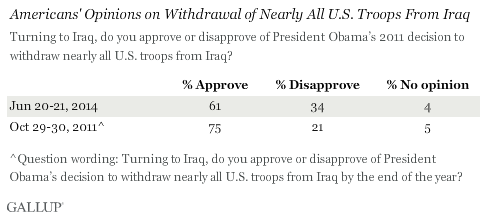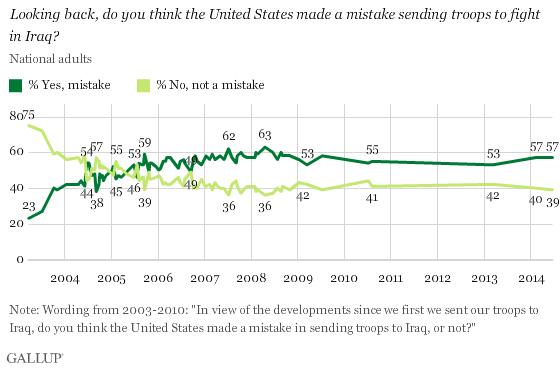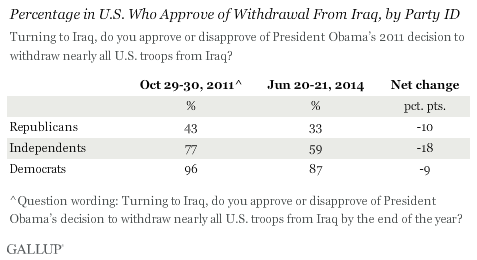WASHINGTON, D.C. -- More than three if five Americans (61%) still support President Barack Obama's 2011 decision to remove nearly all U.S. troops from Iraq -- a move that congressional critics and former Bush administration officials have heavily scrutinized as Iraq falls into crisis. However, public support for the U.S. withdrawal from Iraq has fallen 14 percentage points from October 2011, a few months before nearly all troops left the country.

The government of Iraq has faced an existential crisis as Sunni militant groups capture major portions of the country and press onward to Baghdad, the capital. The Islamic State of Iraq and the Levant (ISIL), a terrorist organization with previous ties to al-Qaida, is a leading force behind this violent insurgency. In response to these threats, Obama has sent 275 military troops to help secure the U.S. embassy in Iraq and 300 military advisors to assist the Iraqi government, the latter decision announced as this June 20-21 Gallup poll was conducted.
One factor that undoubtedly contributes to the broad support for the withdrawal of troops from Iraq is the enduring unpopularity of the decision to send troops there in the first place. A majority (57%) see the U.S. decision to send troops to Iraq in 2003 as mistake. This reading is identical to what Gallup found in February of this year before the latest round of devastating attacks against the Iraqi government.

Republicans Least Likely to Approve of Withdrawal Decision
One-third of self-identified Republicans approve of Obama's 2011 decision to withdraw troops from Iraq, by far the lowest level of support for the decision across partisan groups. Support is highest among Democrats, at 87%, followed by independents, at 59%.

All three partisan groups are less likely to back the withdrawal now than they did in 2011, with independents showing the greatest change in opinion -- approval fell by 18 points. Approval among Democrats and Republicans also saw decreases by significant amounts, nine and 10 points, respectively.
Bottom Line
Undertaken with overwhelming public support and a major campaign promise, Obama's 2011 withdrawal of nearly all U.S. troops from Iraq is now slightly more controversial as the country edges toward civil war. Although a majority of Americans still back the decision, support for it has dropped 14 points since 2011, even as public opinion remains unchanged on the underlying invasion that brought U.S. troops to Iraq.
Survey Methods
Results for this Gallup poll are based on telephone interviews conducted June 20-21, 2014, on the Gallup Daily tracking survey, with a random sample of 1,012 adults, aged 18 and older, living in all 50 U.S. states and the District of Columbia.
For results based on the total sample of national adults, the margin of sampling error is ±4 percentage points at the 95% confidence level.
Interviews are conducted with respondents on landline telephones and cellular phones, with interviews conducted in Spanish for respondents who are primarily Spanish-speaking. Each sample of national adults includes a minimum quota of 50% cellphone respondents and 50% landline respondents, with additional minimum quotas by time zone within region. Landline and cellular telephone numbers are selected using random-digit-dial methods. Landline respondents are chosen at random within each household on the basis of which member had the most recent birthday.
Samples are weighted to correct for unequal selection probability, nonresponse, and double coverage of landline and cell users in the two sampling frames. They are also weighted to match the national demographics of gender, age, race, Hispanic ethnicity, education, region, population density, and phone status (cellphone only/landline only/both, and cellphone mostly). Demographic weighting targets are based on the most recent Current Population Survey figures for the aged 18 and older U.S. population. Phone status targets are based on the most recent National Health Interview Survey. Population density targets are based on the most recent U.S. census. All reported margins of sampling error include the computed design effects for weighting.
In addition to sampling error, question wording and practical difficulties in conducting surveys can introduce error or bias into the findings of public opinion polls.
View methodology, full question results, and trend data.
For more details on Gallup's polling methodology, visit www.gallup.com.
